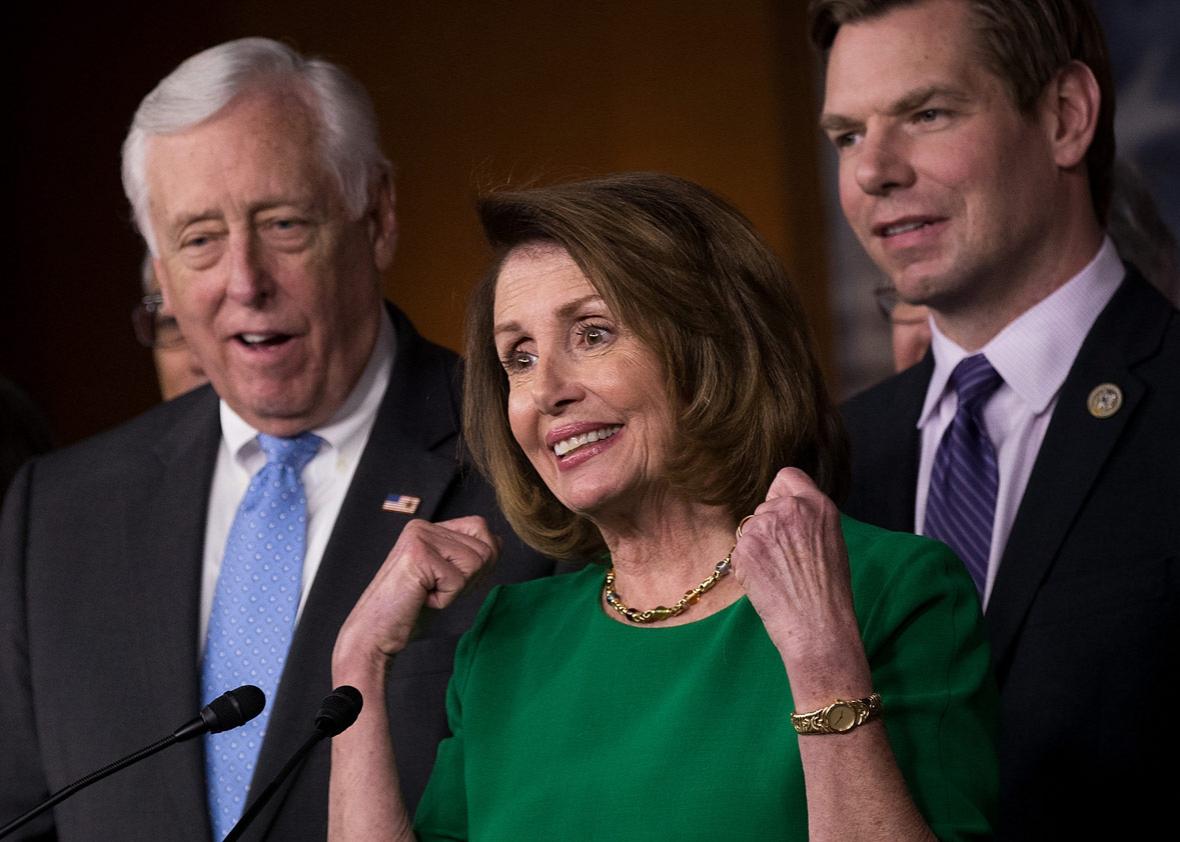The failure of the American Health Care Act last week was obviously great news for Democrats. But it wasn’t just because a remarkably bad health care bill died in the House before it got the chance to die in the Senate. The GOP loss was also confirmation that dysfunctional patterns of Republican Congresses past have been grandfathered into the present era of unified Republican governance. House Republicans still cannot agree on anything, even with a White House trying to chart a unified path forward.
And this means leverage for Nancy Pelosi.
“Needless to say,” the House minority leader said during a roundtable conference with reporters Tuesday afternoon, “our appropriators are on high alert—high alert—for opportunities.” She was describing possibilities for members of her caucus—on the Appropriations Committee and elsewhere—to influence the upcoming government spending bill, which may need House Democratic votes to pass if their Republican counterparts can’t get their acts together.
Had Trump been able to unify House Republicans in support of his agenda, House Democrats would have no real leverage going forward beyond messaging against wildly unpopular Republican initiatives. Instead, intraparty Republican fault lines of the Obama era reasserted themselves, presenting Pelosi’s caucus with that opportunity she mentioned. There are still a few dozen hard-line conservatives in the Freedom Caucus on whom presidential arm-twisting does not appear to work. The further a bill is moved rightward for these hard-liners, meanwhile, the fewer votes it has among House moderates or in the Senate. If this dynamic reasserts itself in fights over upcoming must-pass bills—the government funding measures due at the end of April and again at the end of September, along with the debt ceiling increase in late summer—Speaker Paul Ryan will need to come to Pelosi for Democratic votes.
And doesn’t she know this. Or at least, she suggested coyly, she’s heard this.
“You hear all kinds of things—I don’t know if any of them are true, do you?” she said. “That they’re going to need many more Democrats to pass the [April government funding bill] than anybody ever thought. I don’t know if that’s true. I guess it depends on what’s happening in their caucus.”
A quick glance at the news suggests that what’s happening in the House Republican caucus is disunity about fundamental questions of what the government should and should not do. Conservatives, for example, do not believe that the government should be involved in the business of giving Planned Parenthood federal dollars. Defunding Planned Parenthood was a plank of the AHCA, which is now dead. The same Freedom Caucus members who refused to support that bill, then, are mulling another push to defund Planned Parenthood through the April spending bill. Though Speaker Paul Ryan said this morning that defunding Planned Parenthood is better done in a reconciliation bill than in a spending bill, that might not satisfy conservatives. (Also, which reconciliation bill? The still-dead one?) If Ryan doesn’t yield and conservatives don’t budge—perhaps realizing that the Senate would prevent such a measure from passing—he would need Democratic votes to stop a government shutdown by a party in unified control of said government.
Pelosi said that if Republicans are going to need Democratic votes, they should recognize that now—not an hour before the government shuts down.
“This isn’t about, they bring us a bill and say, ‘we need your votes, how can we tweak this?’ ” she said. “You want our votes? We’ll sit down together and write a bill. And it depends on how many they need.” She added that the April funding bill “is probably one of their easier bills,” ahead of the debt ceiling vote and the “budget from hell” they’ll try to pass for the fiscal year beginning in October.
How might Democrats try to use that leverage? One option would be to try to force Republicans to help make Obamacare work, rather than to intentionally sabotage it.
That could mean insisting Republicans appropriate billions to shore up the program. The Affordable Care Act requires insurers to reduce out-of-pocket payments for low- and middle-income Americans who’ve purchased certain exchange plans. The federal government’s ability to reimburse insurers through cost-sharing reduction, or CSR, payments has been tied up in litigation following a lawsuit—filed by House Republicans—arguing that the money for these reimbursements wasn’t explicitly appropriated. If these payments did stop, insurers would sustain billions in losses, and marketplaces would collapse. Republicans could either pull the lawsuit or appropriate the money if they wanted the Affordable Care Act to function as it should. They don’t. But the need for Democratic votes could change their minds.
“They can’t possibly think that we would be accomplices aiding and abetting them in undermining the Affordable Care Act,” Pelosi said of Republicans drafting the spending bill. “They must know that.”
Pelosi has said that she had planned on retiring from Congress if Hillary Clinton had won the election.* She has also said that she stayed on for another term as leader—against the wishes of about one-third of her caucus—because her skills would be needed in exploiting leverage points. House Republicans have a simple way of denying her leverage in the filibuster-free, majoritarian chamber: staying united. Since that’s proving harder than it seems, Republicans could be ceding Pelosi extraordinary power to shape policy in must-pass bills. It’s a power she knows how to use.
*Correction, March 29, 2017: This article originally misstated that Pelosi would have retired if Hillary Clinton had won re-election. (Return.)
